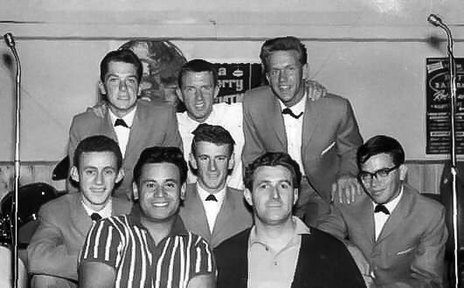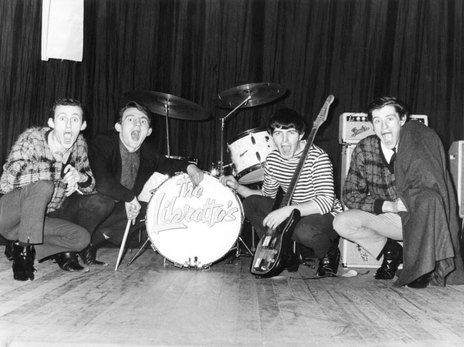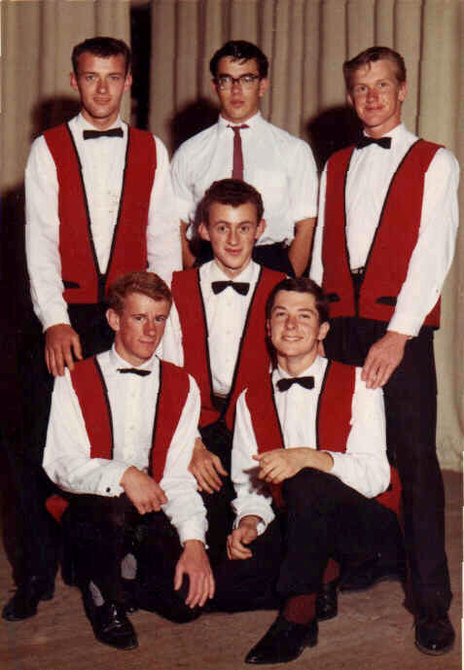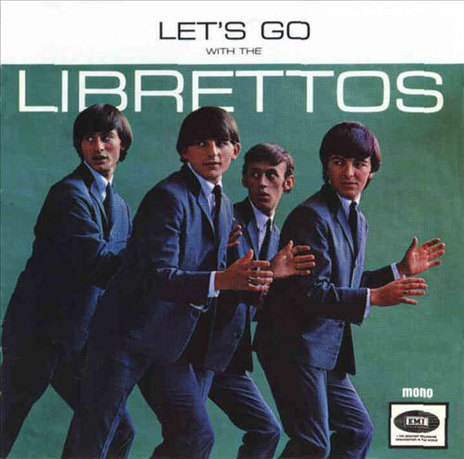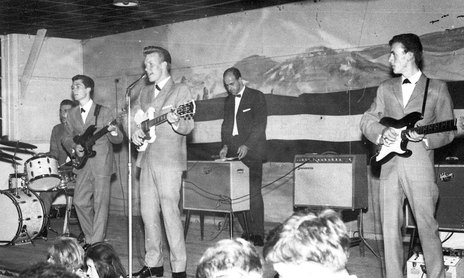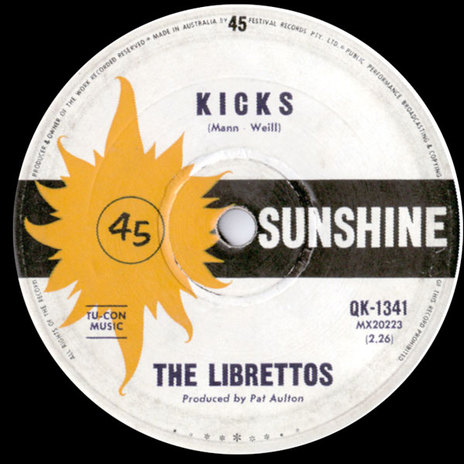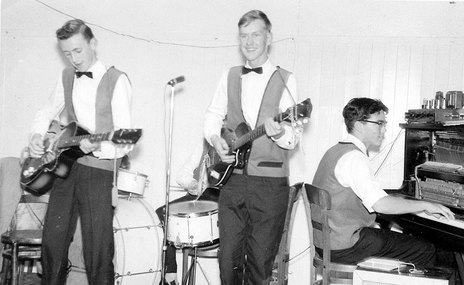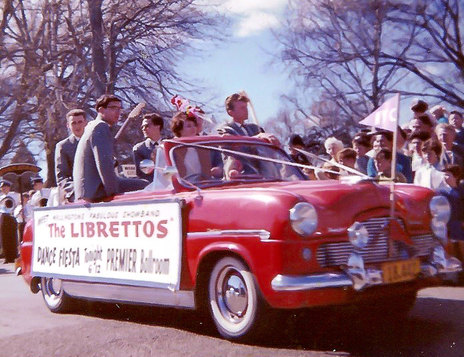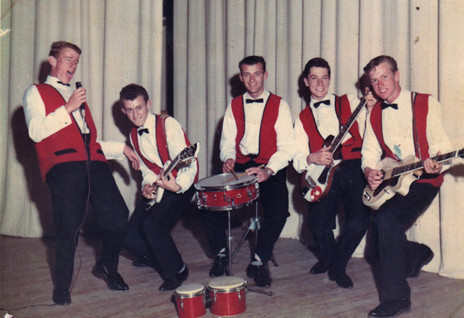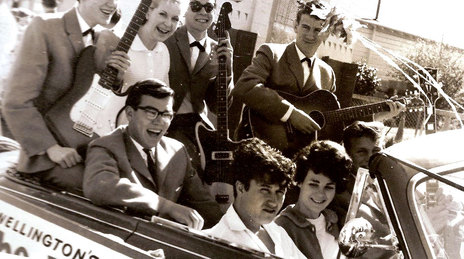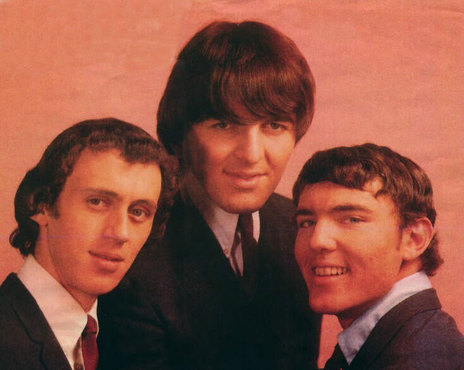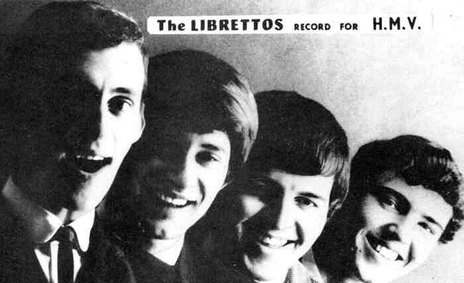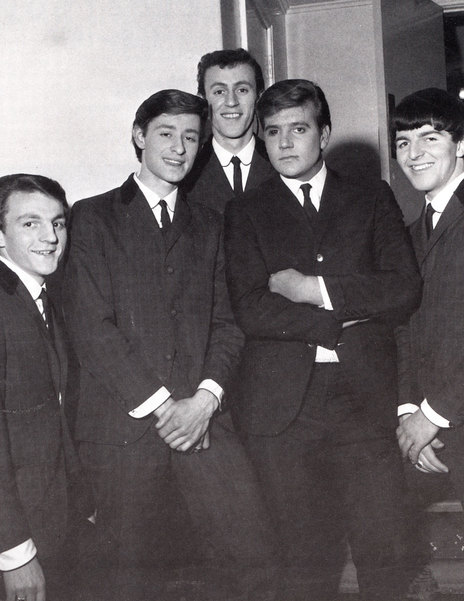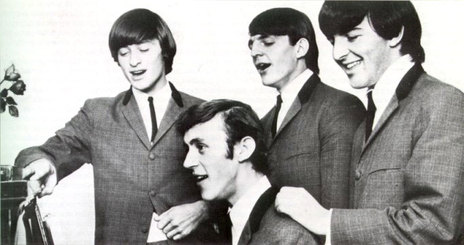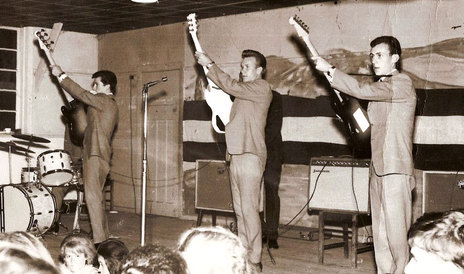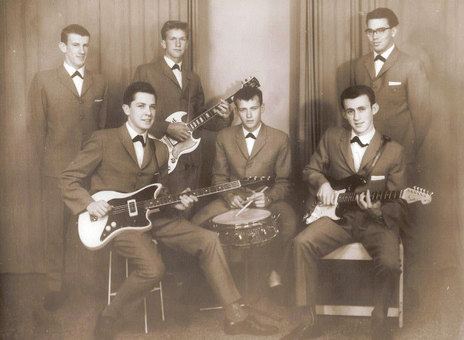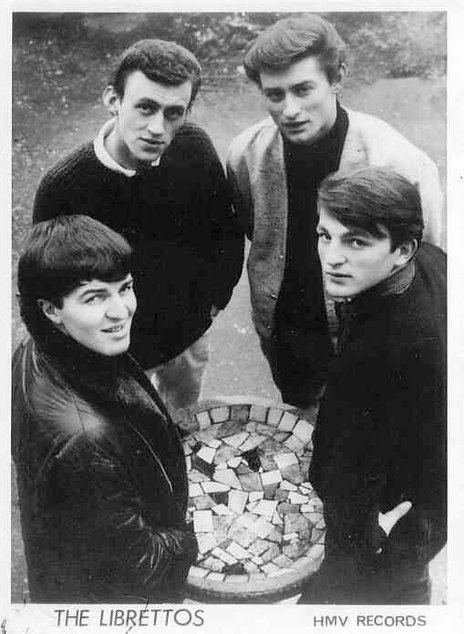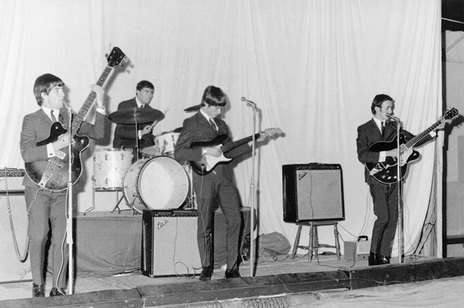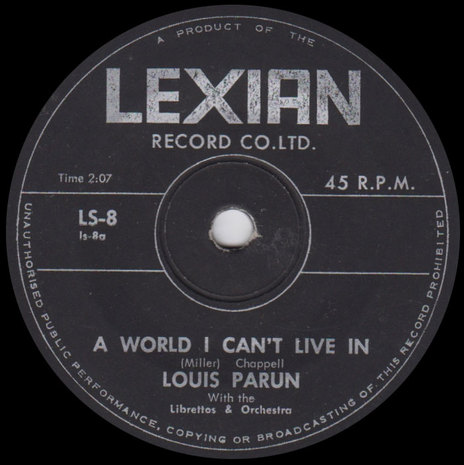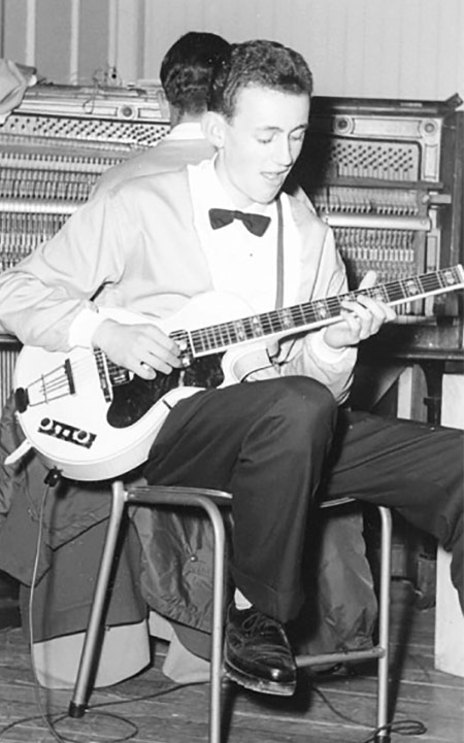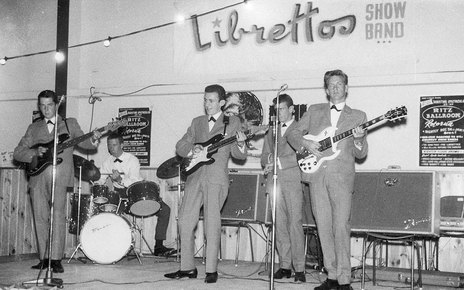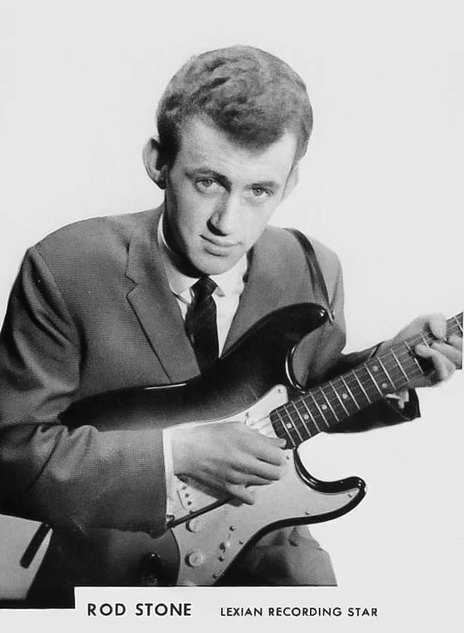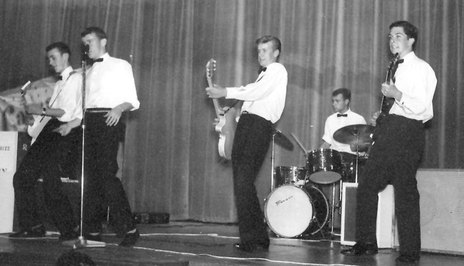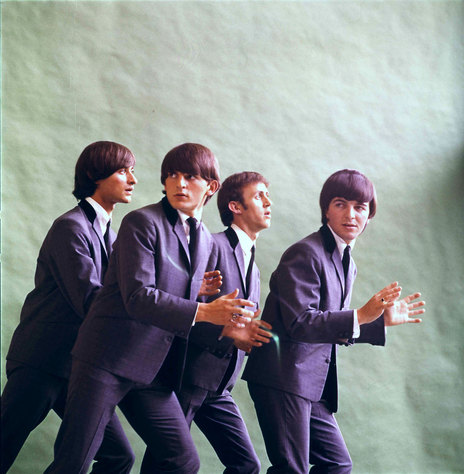The sharp-suited Librettos launch quickly into The Ventures song that is the theme for a hot Wellington-based TV music show. Like Let’s Go, The Librettos were young, raw and oh so electric, peddling a hot new sound in a hot new medium.
Master guitarist Rod Stone, singer and guitarist Lou Parun, bassist Brian Peacock and drummer Dave Diver were already Wellington’s top group, fast taking off to national fame after a spot on a well received 1964 national tour with Billy J Kramer and The Dakotas and Cilla Black, and a string of consistently well attended shows around Wellington, and at Teenarama, the hot teenage dancehall of the era.
The years of struggle around Wellington were paying off. The rock and roll band with the operatic name had been there at the beginnings of the group sound in New Zealand, formed in 1960 by singer Roger Simpson, pianist Dave Clark, guitarists Rod Stone and Johnny England with Paul Griffin (bass) and Andy Shackleton (drums), later replaced by Gordon Jenkins. When Jenkins also departed, he was replaced in December 1963 by a young opportunistic Christchurch drummer, Dave Diver, late of The Tempest and The Secrets, who’d approached Rod Stone to offer his services during a brief stint in Wellington.
Johnny England, reluctant to go fulltime, was next to leave, eventually releasing ‘Jezebel’/‘Linda Lu’ as Johnny England and The Titans (The Premiers going incognito) and joining The Verse 5 in the late 1960s. He was replaced by solo singer Lou Parun, who was a veteran of four solo singles for Lexian Records, some backed by The Librettos. Rod Stone also had a solo single on Lexian (Stone says it was effectively an early Librettos release) with ‘Skye Boat Song’ backed with ‘Friendly Persuasion’.
The classic Librettos line-up was now complete and with their sound plugged into the fast flowing current of pop, they edged past rivals The Premiers to become the top Wellington group.
Much to the concern of Dave Diver, The Librettos lost a talented bass player in Paul Griffin. Diver had moved to Wellington for The Librettos and he could see them disbanding. In came Brian Peacock, late of Nelson’s The Downbeats. With Peacock, the group gained a strong stage presence and eventually a songwriter. He also prompted a change in sound with more beat and R&B songs finding their way into their sets.
The classic Librettos line-up was now complete and with their sound plugged into the fast flowing current of pop, they edged past rivals The Premiers to become the top Wellington group. Confidence brimming, manager Ian Dawson (of Dawson-Cooper Associates), arranged an audition at HMV Records. The Librettos quickly signed to the label and Castle Publishing. This was a boon for the band as the previous line-up had been turned down.
Through 1964 into 1965, The Librettos cut four singles at HMV studios with engineer Frank Douglas – ‘Funny Things’, ‘Young Blood’, the minor hit, ‘Baby, It’s Love’ (a much requested live favourite and one of Peacock and Stone’s best compositions) and ‘It’s Alright’. An album, Let’s Go With The Librettos, with six Stone and Peacock originals (notably ‘I’m Gonna Say Yeah’ and ‘I’m A Dog’) appeared in February 1965.
Overexposed in New Zealand, The Librettos with manager Ian Dawson moved to Sydney in March 1965 after turning down a second series of Let’s Go. With no contacts outside the EMI/ HMV link, The Librettos started the graft again.
They were sacked from the Sylvania Hotel after three nights for playing too much Beatles and mod style music. After that, The Librettos scrambled for work, taking part-time jobs as they searched for a break in the developing Sydney teen scene, where they were competing with hundreds of similarly hungry groups.
Dawson’s dubious managerial doings and the hard times soon got to Dave Diver, who headed home in September 1965. He briefly joined The Countdowns and the embryonic The Avengers, before settling back home in Christchurch’s Five Degrees. His replacement was young Australian Craig Collinge, a drummer studying at the Sydney Conservatorium of Music.
The Librettos eventually landed a spot at a dive called The Sound Lounge in Kings Cross, followed by a spell at the notorious Suzie Wong’s where they replaced the equally notorious The Missing Links.
The Librettos eventually landed a spot at a dive called The Sound Lounge in Kings Cross, followed by a spell at the notorious Suzie Wong’s where they replaced the equally notorious The Missing Links.
In September 1965, The Librettos entered EMI’s Sydney studio to record ‘Ella Speed’. A Leadbelly blues, it was backed with the Stone and Peacock original, ‘I Want Your Love’, for October release in New Zealand and Australia. Their only previous Australian release was a coupling of the New Zealand-recorded ‘Great Balls of Fire’ and ‘Twilight Time’.
By November, The Librettos were starting to make some impact in Sydney, picking up work at The Bowl, one of promoter Ivan Dayman’s chain of teen clubs, where they played three shows a day. They featured on one of Dayman’s package tours of Sunshine Records artists from his booking company and record label backing fellow New Zealander Jim McNaught, Marcie Jones, Peter Doyle and Graeme Chapman, and playing their own set on a "one night stand" tour around rural New South Wales and Victoria that seemed to run for months.
Home to refresh their coffers and visit loved ones over the 1965/1966 holiday season, The Librettos, with newcomer Craig Collinge in tow, received a high profile New Zealand welcome and played the holiday season at the YMCA in Nelson, venturing as far south as Christchurch. They paused long enough for packed hometown shows in Wellington and to be acknowledged as New Zealand’s Best Group of 1965.
Going back to Australia after two failed singles and a low profile previous visit (albeit one which included appearances on the national Sing Sing Sing show presented by Johnny O’Keefe, Saturday Date, Ten on the Town and TV Tonight) took guts, but it was a punt that would pay. Dayman had offered them the chance to record for his Sunshine label (home of stable mate Normie Rowe) with accomplished producer Pat Aulton.
Ian Dawson had an idea for their first Sunshine single. Go go girls were hip, write a song about them, he said. Stone and Peacock came up with ‘She’s A Go Go’, the flipside to the unimpressive ‘I Cried’. The single flopped, as did the follow-up, a version of Fontella Bass’s ‘Rescue Me’.
Lou Parun had had enough. He quit in April 1966, leaving the music industry for good. Brian Peacock took over lead vocals as The Librettos looked around for a keyboard player to replace Parun. No-one was found, but by then the group were enjoying the three piece line-up, honing a more progressive and experimental sound and gathering a small following, especially among musicians, in their new Melbourne base.
Stone: “By the time we ended up in Melbourne as a three-piece, we played old blues stuff and R&B things. It was very enjoyable, but it didn’t make us a lot of money.”
They had drifted to Melbourne, Australia’s rock capital, for its plentiful venues and active band scene. It was there they had their greatest recording success under their own name (they’d backed lots of Sunshine soloists). The Librettos’ final Australian single, a hot take of Paul Revere and the Raiders’ US hit ‘Kicks’, backed with R&B raver ‘Whatcha Gonna Do About It’, garnered good airplay in Melbourne, but again failed to sell.
When mate Normie Rowe asked Brian Peacock then Rod Stone, if they wanted to join his ace backing band The Playboys for an assault on the British pop scene, The Librettos ceased to be. They played their last show at weekly gig Pinocchio’s in August 1966. A final recording taped at Festival in Sydney, ‘It’s Loving Time’ (a stab at a Righteous Brothers-style epic ballad) remained unreleased.
Normie Rowe bombed in Britain despite six singles and a massive PR push. Rod Stone left early after falling out with the other Playboys, returning to Australia, and forming The Groove with Peter Williams from Max Merritt's Meteors. He is now a guitar teacher in Melbourne and still plays regularly.
Brian Peacock returned to Australia with Normie Rowe in 1967 and joined Procession. He became the road manager for the New Seekers and briefly glimpsed the big-time world of hit songwriting when one of his songs was recorded for the flipside of The New Seekers’ biggest hit, ‘I’d Like To Teach The World To Sing’. Another Peacock composition was slated for The New Seekers’ next single until Elektra Records got cold feet and bumped it back to the flipside. Peacock, like Stone, and indeed, The Librettos, was destined to stay just to the side of real sixties fame.
Dave Diver passed away in Melbourne in March 2010 and was brought back to Christchurch to be buried. Roger Simpson passed on 13th April 2010.
